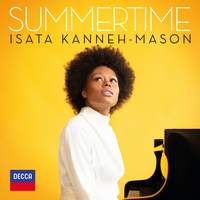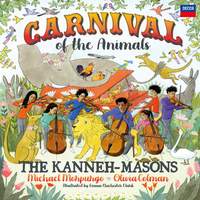Interview,
Isata Kanneh-Mason on Summertime
 Two years on from her debut recording of music by Clara Schumann (which was praised in BBC Music Magazine for its 'intimacy and elegance' and won Newcomer of the Year at last year's Opus Klassik Awards), British pianist Isata Kanneh-Mason's second solo album for Decca is an all-American affair, featuring Barber's Piano Sonata from 1949, plus music by George Gershwin, Amy Beach, Aaron Copland, and Samuel Coleridge-Taylor.
Two years on from her debut recording of music by Clara Schumann (which was praised in BBC Music Magazine for its 'intimacy and elegance' and won Newcomer of the Year at last year's Opus Klassik Awards), British pianist Isata Kanneh-Mason's second solo album for Decca is an all-American affair, featuring Barber's Piano Sonata from 1949, plus music by George Gershwin, Amy Beach, Aaron Copland, and Samuel Coleridge-Taylor.
Having hugely enjoyed speaking to Isata about the Clara Schumann project in 2019, it was a great pleasure to catch up with her over Zoom last month to find out more about how her passion for American piano music was ignited, the special pleasures of Earl Wild's virtuoso Gershwin transcriptions, the connection between Coleridge-Taylor and her own family, and how her siblings' input helped the album to take shape...
The Barber Piano Sonata is still relatively under-represented on record – how long has it been in your repertoire, and what attracted you to the piece?
I started working on it around a year ago (so six months before the recording-sessions), but I’d been enjoying other people’s recordings for about a year before that, so it’s a piece I’ve known for a while. As you say, it’s quite under-recorded and under-played, but I love that kind of music and just thought it was a fantastic piece - it really resonated with me on an emotional level, but also on a pianistic level it seemed like it would be such fun to play! I listened to recordings by Vladimir Horowitz, Van Cliburn and Joanna MacGregor, so I had quite a range of pianists and I loved all of the different things that they brought to the music.
Do you feel there are parallels with the Barber Sonata and the other repertoire on the programme, or were you more interested in the contrasts?
I would say it’s a mixture of parallels and contrasts: the Sonata is definitely the central work on the album, and the Barber Nocturne complements it, as do the Copland and Gershwin in different ways. I think pieces like the Nocturne and Copland’s The Cat and the Mouse offer one way into the music, then there’s definitely a huge contrast from the Samuel Coleridge-Taylor to the Earl Wild to the Barber Sonata. I knew I wanted to have quite a wide range of American music: of course it’s an all-American album, but I was keen for it not to be just one sound-world. I’ve never actually studied or lived in America, although I did a tour of the US with my brother Sheku and have always really enjoyed playing there. But that connection I felt with the Barber Sonata sparked a real compulsion in me to explore American repertoire, and once I got started I was fascinated by how diverse it all was.
it was also important to me to have a something by a female composer to represent all the different types of American music, and I just fell in love with the Amy Beach piece because it’s so beautiful and calming, almost like a meditation in many ways. Although I don’t know if she was at all influenced by Debussy, it sounds quite Impressionistic to me – but I don’t want to put influences into her mouth, as it were, because I feel like she has her own very unique sound-world!
The Samuel Coleridge-Taylor Impromptu is a world premiere recording – how did you discover it?
It was actually through my sister, who’d played it before I started thinking about this album – I was looking for another Coleridge-Taylor piece to complement the selection of spirituals and she said ‘How about this one?’. It was actually the first piece of music I’ve played where I had to work out how it went just from looking at the score and then sitting at the piano – normally I would seek out a recording of something I’m working on, or go to hear it in a concert, so that was an interesting process! It reminds me of a childhood miniature in many ways, whereas his spirituals have a different kind of depth to them, but I definitely see them as existing in a similar bracket of sound-worlds.
Coleridge-Taylor made so many wonderful arrangements of spirituals, so there were some very difficult choices to be made when it came to selecting some for the album! Deep River was a no-brainer because I’d already done a piano trio arrangement of it with my brothers, so that was always simmering, and my brother insisted ‘You have to do Sometimes I Feel Like A Motherless Child, because it’s just so beautiful!’. Both of those are quite slow, so I started looking for something livelier for a bit of contrast, which is how I came across The Bamboula. I think it’s lovely that Coleridge-Taylor’s father was from Sierra Leone, like my mum – that’s the sort of link that I never find with classical composers, so I felt compelled to have some of his music on the album.
Are the Earl Wild Gershwin paraphrases as formidably technically demanding as they sound?!
They are technically demanding, but I think because Earl Wild was himself such a fantastic pianist he composes in a way that fits completely under the hand: when you first start learning the notes it seems incredibly difficult and daunting, but after a while it makes lots of logical sense. He’s thought a lot about how the hands work together and really understands all the mechanisms of playing the piano, so once you get past that initial stage they end up being really comfortable to play!
I listened to a few different recordings initially, and then after a while decided it was time to put them to bed and strike out on my own! I enjoyed Kirill Gerstein’s recording of I Got Rhythm a lot – I think he’s such a great pianist. Elizabeth Joy Roe also recorded some, and I loved her voicing in Summertime in particular.
Gerstein studied jazz in parallel to his classical training – is that something you’ve done too?
I haven’t actually had any specific jazz training at all, but I’m so interested in that sound-world and I just love exploring it. And I’ve always enjoyed making arrangements, which is very much a thing in my family: when we were younger we had the Sibelius software and it was almost like a game for us all, composing and arranging music to play together! It’s something I definitely want to do more of.
Aside from the recording of Saint-Saëns’s Carnival of the Animals which you made with your family last year, how has lockdown been treating you?
The live concerts and travel have of course been the most difficult aspect – by default I’ve definitely focused more on recording, and appreciated having the space to go into depth with that. I’ve also spent a lot of the time really just discovering who I am as a musician, uncovering deeper levels of detail in the music I’m working on and exploring new repertoire. Of course alongside that I’m very impatient to get back to performing concerts, because you really get to know these things through performing them: trial and error plays a big role as well as practising on your own, so I’m so happy to see things opening up. I actually did my first proper live concert since December yesterday [25th May]: there were occasional things during lockdown, but it had been over a year since I’d played to a non-distanced audience and it was so wonderful to get back!
You mentioned the ‘difficult decisions’ that had to be made regarding the Coleridge-Taylor spirituals: is there any other American repertoire that didn’t make the final cut, and which you might think about recording in future?
There’s lots more Copland that I love, especially the Piano Sonata, and I adore the Barber Excursions, which I was planning to include on this album at one point. But of course there’s only so much you can fit onto one disc, and in the future I definitely hope to explore this kind of repertoire a bit more…
Isata Kanneh-Mason (piano)
Available Formats: CD, MP3, FLAC, Hi-Res FLAC
Michael Morpurgo & Olivia Colman (narrators), The Kanneh-Masons
Available Formats: CD, MP3, FLAC, Hi-Res FLAC




